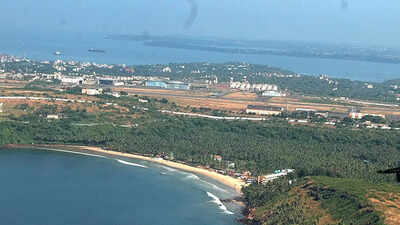State pollution board asks IIT for full study of Goa air quality

Aerial view of Goa
PANAJI: The Goa state pollution control Board (GSPCB) has decided to conduct a comprehensive study to understand the air quality across the state for future mitigation strategies.
The board has asked IIT-Goa to complete the study (formally called machine learning and sensor-based network for continuous air quality monitoring and prediction) in two years.
GSPCB chairman Mahesh Patil said that the scope of the study includes a comprehensive understanding of air quality data across the state, and to use various data science and machine-learning methods to utilise the existing data available for predictions and future mitigation strategies.
“Various techniques would be used to study the possible correlation between the measured quantities,” he said.
IIT will submit an interim report to the board, which will be scrutinised and thereafter, approval shall be given for deploying a sensor-based network, GSPCB said.
Patil said that in the first six months, emphasis to be on analysis of the available data.
“Subsequently, the emphasis will be to develop a forecasting tool that would predict air quality based on historical data. Since air quality information is time-series data, relevant machine learning techniques will be explored for creating a forecasting model by the institution,” Patil said.
Patil said that to deploy a sensor-based network, initial emphasis will be on finding the apt sensors and developing methods for real-time air quality monitoring.
“After ensuring the suitability of the sensor-based network at the Goa College of Engineering campus where IIT-Goa is situated, this will be employed closer to one of the hotspots for air quality monitoring for real-time data collection,” he said.
Patil said that it is envisaged to have data collected for the course of one year so that the sensor response to seasonal variations can also be captured. The last six months of the project will be predominantly for data analysis and finalising the forecast model for the sensor-based network.
The board has asked IIT-Goa to complete the study (formally called machine learning and sensor-based network for continuous air quality monitoring and prediction) in two years.
GSPCB chairman Mahesh Patil said that the scope of the study includes a comprehensive understanding of air quality data across the state, and to use various data science and machine-learning methods to utilise the existing data available for predictions and future mitigation strategies.
“Various techniques would be used to study the possible correlation between the measured quantities,” he said.
IIT will submit an interim report to the board, which will be scrutinised and thereafter, approval shall be given for deploying a sensor-based network, GSPCB said.
Patil said that in the first six months, emphasis to be on analysis of the available data.
“Subsequently, the emphasis will be to develop a forecasting tool that would predict air quality based on historical data. Since air quality information is time-series data, relevant machine learning techniques will be explored for creating a forecasting model by the institution,” Patil said.
Patil said that to deploy a sensor-based network, initial emphasis will be on finding the apt sensors and developing methods for real-time air quality monitoring.
“After ensuring the suitability of the sensor-based network at the Goa College of Engineering campus where IIT-Goa is situated, this will be employed closer to one of the hotspots for air quality monitoring for real-time data collection,” he said.
Patil said that it is envisaged to have data collected for the course of one year so that the sensor response to seasonal variations can also be captured. The last six months of the project will be predominantly for data analysis and finalising the forecast model for the sensor-based network.
FOLLOW US ON SOCIAL MEDIA
FacebookTwitterInstagram
Looking for Something?

Start a Conversation
end of article
Visual Stories
Quick Links
Assam FloodDelhi TemperatureChennai WeatherBangalore TemperatureCovid vaccination centres in DelhiCoronavirus in DelhiRTPCR test in GurgaonHyderabad RainPollution level in BangaloreDelhi SmogDelhi TemperatureNoida AQIGurgaon AQI todayFire in MumbaiMumbai RainsCovid 19 RT PCR Test in NoidaDelhi AQI todaySrinagar encounter

